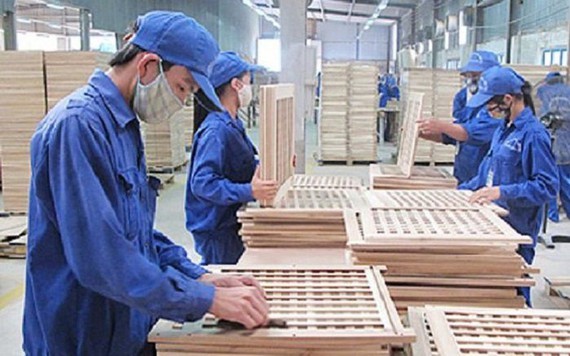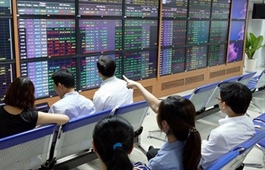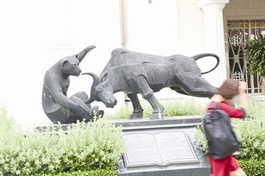Unprofitable companies scramble to raise capital
Unprofitable companies scramble to raise capital
The stock market is the driving force for listed companies to strongly issue shares to increase capital. However, it is when unprofitable listed companies scramble to issue volumes of shares that the market becomes susceptible to facing many risks.
Continuous losses
According to Fiinpro data, in the first quarter of 2021, there were 43 listed companies mobilizing nearly VND 19,800 bn for issuing about 1.1 billion shares to existing shareholders, equivalent to 70% of issue value of the whole year of 2020. This is the highest level in terms of both volume as well as value of issue increased quarterly, ever since the outbreak of the Covid-19 pandemic in Vietnam. With the Covid-19 pandemic being controlled and contained, the need to raise capital to expand production and business activities of many small and medium enterprises (SMEs) has been reactivated. This has also brought the debt or equity ratio to a safer level.
Relatively positive business results, plus a prosperous stock market, especially in the first months of the year, has been a boast for some businesses. Most of the shares issued were successful such as by NoVa Land Investment Group Corporation (NVL); Hung Thinh Incons (HTN); and the An Phat Holdings Group Joint Stock Company (APH). The number of shares will be even higher when many companies submit their capital increase report during the regular AGM sessions later this year.
At the 2021 Annual General Meeting of Transport and Industry Development Investment JSC (TCD) on 29 April, the Board of Directors set a target for the next five years, with average revenue growth of 22%, and average growth of profit after tax of 29%. TCD has submitted to shareholders a plan to raise capital for the purpose of project financing and looking for more M&A opportunities in the field of quarry mining and potential building material mines, in order to increase the capacity of the construction sector.
According to a future goal, TCD intends to submit a plan to issue 87.2 million shares by offering existing shareholders a ratio of 1:1 at VND 10,000 per share, with 50 million shares through private placement to strategic investors at an expected price of VND 12,000 per share. TCD parent company, Bamboo Capital Joint Stock Company (BCG), previously issued about 67.4 million shares to increase charter capital to VND 2,034 bn. BCG capital increase is part of its business plan in 2021 for a five-fold increase in profit after tax, reaching VND 917 bn.
It is worth mentioning that not just good businesses but also sluggish businesses plan to issue a huge amount of shares to increase capital. For example, Truong Thanh Furniture Corporation (TTF) accumulated losses to the tune of VND 3,043 bn and negative equity of VND 584.8 bn, as of 31 December 2020. However, at the 2021 annual shareholders meeting on 27 April, the board of TTF submitted a plan to offer 100 million shares at VND 10,000 per share, equivalent to VND 1,000 bn. The paradox now is that the share price of TTF when traded on the stock market will be around VND 7,000 per share.
Unrealistic plan
The ability of TTF to complete their capital raising plan is extremely difficult. Assuming that the price difference factor is excluded, investors will not easily put money into enterprises that plan to raise VND 1,000 bn, but only keep capital at hand of about VND 240 bn, while using the remaining VND 760 bn to settle overdue debts and swap debts for banks and partners.
Mr. Mai Huu Tin, Chairman of TTF Board of Directors, is also aware of the difficulties to raise capital and has told shareholders he intends to spend VND 100 bn to buy 10 million shares from this additional issue. According to Mr. Tin, after being able to write off bad debts, TTF will enter a new phase with revenue of USD 1 bn. TTF plan in the next ten years is to become the leading timber enterprise in ASEAN in terms of technology, output, revenue, and in particular in the field of wooden furniture.
The company has painted a bright picture, but in their 2020 audited financial statement, TTF emphasis was on the ability of the company to operate prosperously in future. Although business results in 2020 were profitable, TTF has an accumulated loss equivalent to 97.8% of charter capital and also negative equity, while HoSE continues to maintain control, specifically with HNX code of Hoang Anh Gia Lai Agricultural Joint Stock Company (HNG), due to losses in 2020.
According to the audited consolidated financial statement of 2020, profit after tax of the parent company shareholders in 2020 was negative at VND 20.91 bn, and undistributed after tax profit as of 31 December was also negative at VND 2,306.11 bn. However, TTF still plans to issue shares to increase capital. The company is issuing about 740 million shares at VND 10,000 per share, equivalent to VND 7,500 bn, leaving VND 5,500 bn for debt swap and VND 1,900 bn for added working capital.
Risky involvement
Compared to TTF, HNG has more advantages thanks to the stock price on the stock market currently reaching VND 11,000 per share, but the possibility of success of this issuance is still open because no investor wants to pour capital in stocks in warning mode. There is risk involved when additional shares issued to the account drop below the purchase price of VND 10,000 per share.
This is a real risk and is happening quite a lot on the stock market. For example, BCG received great response from investors, but before and after 67.4 million more shares were issued to the account, BCG was under great selling pressure because investors feared that supply increased strongly. This stock code had a sharp decline from VND 15,000 per share to VND 12,000 per share. BCG plunge caused investors to buy shares in the additional issuance at VND 10,000 per share, with almost no profit, even a loss, because the share price was adjusted down during the trading day and was not entitled as before.
Investors who buy additional shares also face many other risks, especially companies that issue shares with strong capital increase such as IDJ Investment JSC (IDJ), Vinafreight JSC (VNF), SCI E&C JSC (SCI) and Easterns AHP Minerals Joint Stock Company (BMJ). With these businesses, the increase of capital by 2 to 5 times will make profit keep up with the capital increase. This means that the indexes such as P/E, and P/B of many stocks, which were already quite high after a period of price increase, continue to increase, making the stocks less attractive to investors.
Raising capital through the stock channel brings many advantages for businesses because this is a cheap source of capital. However, the downside of this activity is the pressure on enterprises themselves to maintain their business results corresponding to the capital share such as revenue, profit, dividends, and further impact on stock trading on the stock market. Failure to ensure the level of profitability after increasing capital will cause dilution pressure and risk of lowering the share price with shareholders, who have trusted the company to pour in capital.






































